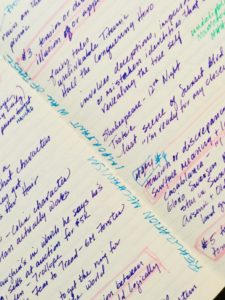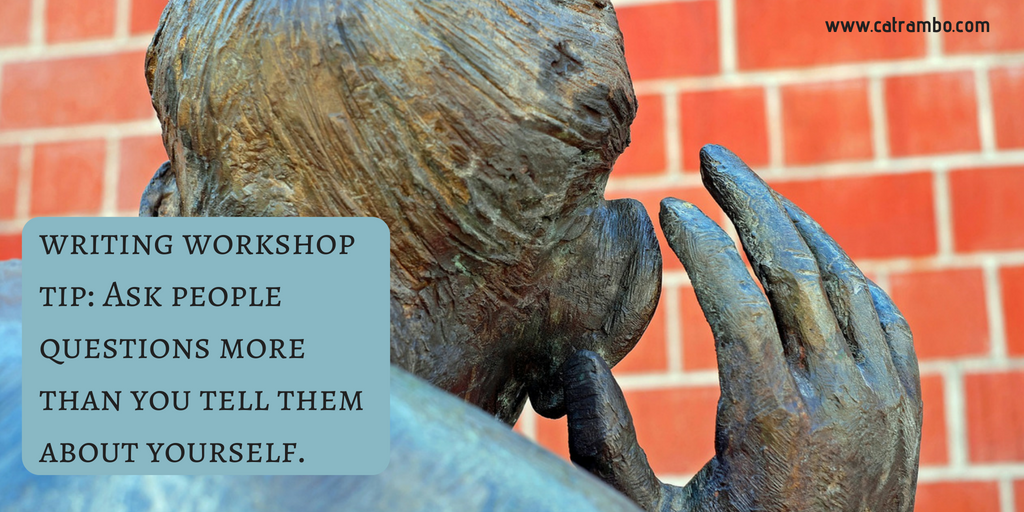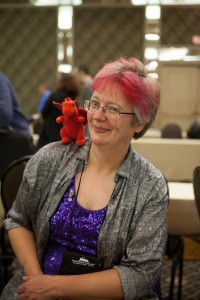 A student wrote in to let me know they’d made it into Odyssey, huzzah, and asked if I had any advice about attending a workshop. As a matter of fact I do. Like many things in life, you get more out of a workshop if you’re willing to invest a little effort beforehand, during, and afterward.
A student wrote in to let me know they’d made it into Odyssey, huzzah, and asked if I had any advice about attending a workshop. As a matter of fact I do. Like many things in life, you get more out of a workshop if you’re willing to invest a little effort beforehand, during, and afterward.
I went through a number of workshops in college at both the undergraduate and graduate level, but the place where I learned the most was Clarion West, a six week workshop in Seattle. My instructors were Octavia Butler, Andy Duncan, L. Timmel Duchamp, Connie Willis, Gordon van Gelder, and Michael Swanwick; my classmates included Ann Leckie, E.C.Myers, Rashida Smith, and Rachel Swirsky, among others. If you read a lot of F&SF, you may recognize many of those names and realize how incredibly privileged I was to be part of that year.
How I Prepared
- Read work by your instructors. At least a few stories or a novel. Get a sense for what they will be able to give; there will be things you won’t expect, but you will learn what you like and dislike about their writing and what you want them to teach you.
- Come with story ideas. Not stories, but prompts and scenes. A list of potential titles. A page where you took fifteen minutes to generate ideas.
- Put other shit on hold. Clear the decks so unrelated work and deadlines is not distracting you. You want to give it your all. The spouse of one of my fellows had their children writing letters saying how much they missed the parent and wanted them to come home, and it was one of the clearest examples of someone sabotaging their partner that I have ever witnessed. Don’t let anyone do this to you. Make the most of the workshop while you can.

Useful Things I Did
- Go first. One of the things that has stood me well in life is a habit of volunteering to go first, mainly due to a let’s-just-get-this-over-with-already impatience. I’ve done it every time I’ve been in a workshop and it helps you not feel that you have to live up to earlier examples. Do a nice job and you can actually be that intimidating classmate whose work people worry about living up to.
- Talk to people. Your fellow students are a peer group you’ll be interacting with for years to come. Be a good citizen and avoid being a jackass, even if it’s your natural tendency. Ask people questions more than you tell them about yourself. Listen.
- Take good notes. I like to write stuff down, at the time in Moleskinnes. If there was ever a time for learning to write good notes, this is it. If you have difficulty, you might ask your classmates about recording.
- Take care of your body. Six weeks is a long time and one in which health issues can develop if you’re not careful. Stretch. Walk daily; work out a few times each week if you can. You will emerge more energetic and creative as a result of investing that time and effort.
What I Would Have Done Differently
- You can’t go home again. I did go home two weekends in order to hang with my spouse and cats. In retrospect, while that did recharge me, I should have spent that time hanging out with my classmates since that time was pretty finite.
- Take some board games. I don’t know why I didn’t think to do this, perhaps because we weren’t gaming as much then as we used to. I would take games that were easy to teach, had a timespan of never more than an hour or hour, and which stressed creativity. Examples: Codenames, Dixit, Fiasco, Microscope.
Life Post-Workshop
- Grieve that idyllic life a bit. It’s okay to mourn. You will miss some of your classmates fiercely. Some will become lifelong friends; others will fade back into the world and never be heard from again.
- Go back over your notes. I still go back over my notes periodically, sometimes making notes in a different color; I’m about due to review these again.
- Write and write and write some more. Apply what you’ve learned. Experiment. Reply to other people’s stories with your own. And send stuff out. And welcome to you. Once you have made the first sale of six cents or more a word, join SFWA, but even before then use its resources like the SFWA Blog, Writer Beware, and the SFWA reading series across the country.
Can’t make it to a live workshop? There’s also plenty of online ones. My own Rambo Academy for Wayward Writers features two this weekend: How to Write Better Food with Cassandra Khaw and Ideas Are Everywhere with Rachel Swirsky.
Here’s a full list of live classes and details about how to take one for free. Or consult the excellent list of speculative fiction workshops Kelly Robson has compiled.





 The Rambo Academy for Wayward Writers now has a certification program! I wanted students to have a way to represent the work they’ve put into the live classes when applying for jobs, workshops, and other opportunities, and so I’ve put together four categories.
The Rambo Academy for Wayward Writers now has a certification program! I wanted students to have a way to represent the work they’ve put into the live classes when applying for jobs, workshops, and other opportunities, and so I’ve put together four categories.


One Response